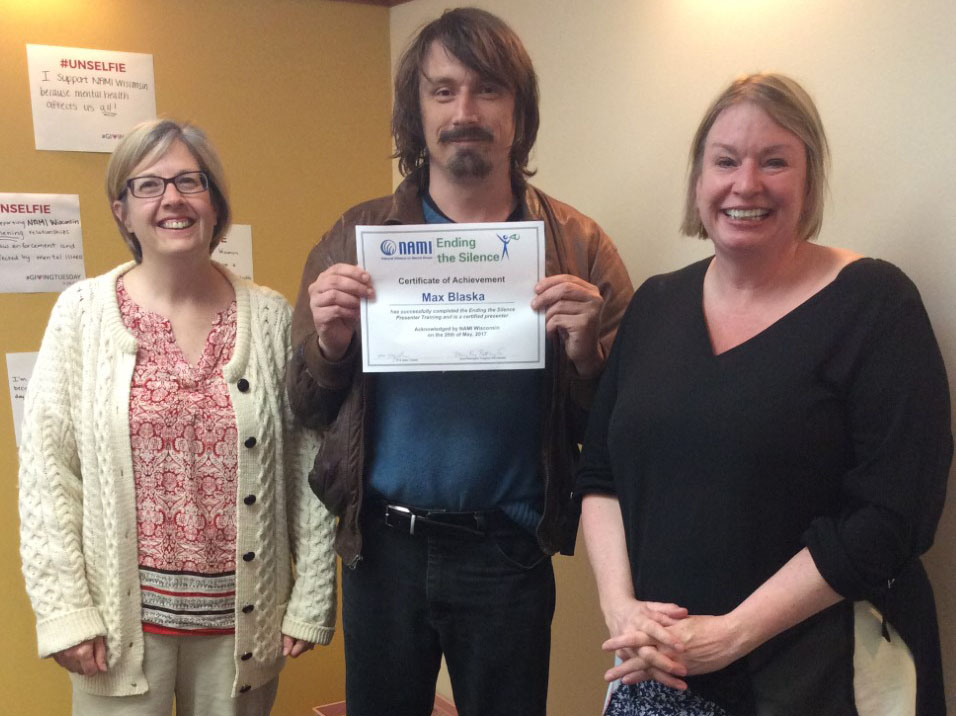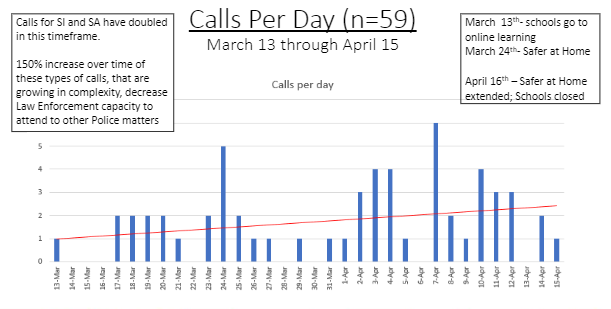Max Blaska has been struggling.
Since the coronavirus pandemic hit, the 43-year-old Madison resident has suffered through days when he hasn’t been able to do anything. Blaska has been living with anxiety and depression since he was a child, and the COVID-19 crisis has flooded him with paralyzing thoughts.
“It’s a beast, I mean it wraps you in tangles in your brain, and depression and anxiety — I like to say it discolors your past. It makes your present miserable and it tries to rob you of your future,” Blaska said.
News with a little more humanity
WPR’s “Wisconsin Today” newsletter keeps you connected to the state you love without feeling overwhelmed. No paywall. No agenda. No corporate filter.
It doesn’t help that he’s been furloughed from his retail job at Macy’s in Madison’s Hilldale Mall. Blaska, who lives alone, misses the interaction with others.
“So thoughts of loneliness that adds to depression or thoughts of me not having a job that adds to depression just magnifies with a quarantine because you’re isolated you’re by yourself,” he said.
Blaska is not the only one who’s struggling.
Many are trying to cope with stress, fear and anxiety stemming from the pandemic. One recent poll of 2,190 adults by NORC at the University of Chicago found the majority of Americans have felt anxious, depressed, lonely or hopeless in at least one of the last seven days the survey was conducted.

Organizations that work to connect people with mental health services in Wisconsin have been seeing a surge in calls for help.
From mid-March to mid-April, just under 19,000 calls were made to the 211 line operated by the private nonprofit IMPACT, Inc., which helps people in crisis in Milwaukee County and nine surrounding counties. More than a quarter of those calls were for health care or mental health services. It was the busiest period in the history of their call line.
“People aren’t normally in this situation, and they’re really not equipped to deal with it very well,” said Sue Beck-Riekkoff, IMPACT’s chief operating officer. “The other thing that I think is that people that have a pre-existing anxiety, depression or other mental health issue, are really feeling more acute symptoms.”
That’s what worries Beth Clay, executive director of Northeast Wisconsin (N.E.W.) Mental Health Connection in Appleton. She and community partners began tracking calls to crisis lines and law enforcement.
Now, they’re sounding the alarm after the number of calls from people — often young to middle-aged men — who were having suicidal thoughts or attempting suicide doubled in Outagamie and Winnebago counties from mid-March to mid-April.

She said the pandemic has created a perfect storm of risk factors for deaths by suicide.
“Because you’ve got physical isolation. You’ve got significant economic stress, decreased access to people’s normal natural supports, as well as whatever treatment supports they might have had in the past,” Clay said.
[[{“fid”:”1245196″,”view_mode”:”full_width”,”fields”:{“class”:”media-element file-full”,”data-delta”:”2″,”format”:”full_width”,”alignment”:””,”field_image_caption[und][0][value]”:”%3Cp%3EWinnebago%20County%20calls%20from%20March%2013%20to%20April%2016.%3Cem%3E%20Data%20courtesy%20of%20N.E.W.%20Mental%20Health%20Connection%3C%2Fem%3E%3C%2Fp%3E%0A”,”field_image_caption[und][0][format]”:”full_html”,”field_file_image_alt_text[und][0][value]”:”Winnebago County calls from March 13 to April 16.”,”field_file_image_title_text[und][0][value]”:”Winnebago County calls from March 13 to April 16.”},”type”:”media”,”field_deltas”:{“2”:{“class”:”media-element file-full”,”data-delta”:”2″,”format”:”full_width”,”alignment”:””,”field_image_caption[und][0][value]”:”%3Cp%3EWinnebago%20County%20calls%20from%20March%2013%20to%20April%2016.%3Cem%3E%20Data%20courtesy%20of%20N.E.W.%20Mental%20Health%20Connection%3C%2Fem%3E%3C%2Fp%3E%0A”,”field_image_caption[und][0][format]”:”full_html”,”field_file_image_alt_text[und][0][value]”:”Winnebago County calls from March 13 to April 16.”,”field_file_image_title_text[und][0][value]”:”Winnebago County calls from March 13 to April 16.”}},”link_text”:false,”attributes”:{“alt”:”Winnebago County calls from March 13 to April 16.”,”title”:”Winnebago County calls from March 13 to April 16.”,”class”:”media-element file-full-width”,”data-delta”:”2″}}]]
Clay said a task force including partners from Outagamie, Winnebago and Calumet counties has been created that’s exploring ideas like mobile crisis teams with mental health professionals that would respond to those law enforcement calls. She worries the longer the pandemic goes on, the more difficult it can be for some people to bounce back.
Mental health providers have been able to set up telehealth sessions to provide treatment, but not everyone is able or willing to use them.
NorthLakes Community Clinic in northern Wisconsin has seen the number of patients seeking behavioral health services decline about 35 percent, said CEO Reba Rice. She said that’s declined even more among those seeking help to recover from alcohol or substance use.
“The statistics about alcohol purchase and consumption is pretty significant, and so we are very concerned about that,” said Rice.
Sales of alcoholic beverages increased more than 50 percent early on when the quarantine began and have been higher overall compared to last year, according to market research firm Nielsen.
Dr. Allison Allen, a clinical psychologist at the NorthLakes clinic in Ashland, said it’s a growing concern.
“The folks that are in recovery, especially in early recovery, were just especially vulnerable I think to the financial stresses and to the isolation and to the potential loss of the support they get from groups and because relapse for them can really literally be a life or death issue,” Allen said.
Some providers fear overdoses are increasing because people aren’t accessing mental health services, including Dr. Chris Eberlein, emergency medicine physician at Gundersen Health System in La Crosse.
“We have seen a 50 percent increase in overdose deaths since COVID has started in our county,” he said.
Eberlein said the county has already seen 12 overdose deaths so far this year compared to 2019 when the county saw 22 overdose deaths the entire year. But, health officials caution more research is needed on whether the deaths are linked to COVID-19. Al Bliss, a health educator with La Crosse County, said it’s possible people are relapsing more due to the pandemic.
“Information that I hear from behavioral health and from other counselors is that people are relapsing more. They are not aware of services being available,” he said. “They’re making changes in services, such as having virtual appointments. Certainly, in the beginning, there has not been the group support programs because of social distancing.”
In Milwaukee County, the number of suspected overdose deaths climbed to 160 in the first three months of this year. An official with the Milwaukee County Medical Examiner’s Office said they are on pace to see a record number of overdoses this year. While exact causes aren’t yet known, officials say it could be due in part to lacking supports during the pandemic.
State health officials are tracking data on the number of deaths by suicide, drug or alcohol use, said Robin Matthies, trauma and resilient program manager with the Wisconsin Department of Health Services. But, she said, they’re still compiling the data and don’t yet have a comprehensive picture on the impact of the COVID-19 crisis. Health officials also are being mindful of how they release that information so as not to further traumatize people.
“We don’t have those numbers that are perfectly designed for us to share out, but we do know the importance of people getting the help and support that they need,” said Matthies.
For more than a year, DHS has been working on an effort to connect the dots between drug and alcohol use and behavioral health in the hopes of addressing root issues. When COVID-19 hit, she said the agency rolled out its Resilient Wisconsin initiative early to provide online tools and resources that connect people to services and help them cope.
“One of the main things is self care and really making sure that you’re doing things for yourself that build up that more positive energy,” said Matthies. “So that might be like exercise. It could be meditation. It’s not a one-size-fits-all kind of thing.”
And, everyone’s struggles are unique.
Some may be coping with job loss or long work days in high stress sectors like health care. Others are dealing with isolation, boredom or fears about the virus.
[[{“fid”:”1245271″,”view_mode”:”embed_portrait”,”fields”:{“alt”:”mental health Lexi Sandoval”,”title”:”mental health Lexi Sandoval”,”class”:”media-element file-embed-portrait media-wysiwyg-align-right”,”data-delta”:”3″,”format”:”embed_portrait”,”alignment”:”right”,”field_image_caption[und][0][value]”:”%3Cp%3ELexi%20Sandoval%20with%20her%206-year-old%20daughter%20Havana.%26nbsp%3B%3Cbr%20%2F%3E%0A%3Cem%3ECourtesy%20of%20Lexi%20Sandoval%3C%2Fem%3E%3C%2Fp%3E%0A”,”field_image_caption[und][0][format]”:”full_html”,”field_file_image_alt_text[und][0][value]”:”mental health Lexi Sandoval”,”field_file_image_title_text[und][0][value]”:”mental health Lexi Sandoval”},”type”:”media”,”field_deltas”:{“3”:{“alt”:”mental health Lexi Sandoval”,”title”:”mental health Lexi Sandoval”,”class”:”media-element file-embed-portrait media-wysiwyg-align-right”,”data-delta”:”3″,”format”:”embed_portrait”,”alignment”:”right”,”field_image_caption[und][0][value]”:”%3Cp%3ELexi%20Sandoval%20with%20her%206-year-old%20daughter%20Havana.%26nbsp%3B%3Cbr%20%2F%3E%0A%3Cem%3ECourtesy%20of%20Lexi%20Sandoval%3C%2Fem%3E%3C%2Fp%3E%0A”,”field_image_caption[und][0][format]”:”full_html”,”field_file_image_alt_text[und][0][value]”:”mental health Lexi Sandoval”,”field_file_image_title_text[und][0][value]”:”mental health Lexi Sandoval”}},”link_text”:false,”attributes”:{“alt”:”mental health Lexi Sandoval”,”title”:”mental health Lexi Sandoval”,”class”:”media-element file-embed-portrait media-wysiwyg-align-right”,”data-delta”:”3″}}]]Lexi Sandoval, a 34-year-old mom from New Berlin, has battled with mental health issues since high school and at one point contemplated taking her own life. Now, she’s a youth outreach specialist working with the National Alliance on Mental Illness in Waukesha. Sandoval, who helps struggling teens, is also adapting to life with her 6-year-old daughter under the stay-at-home order.
“It has to be OK that some days she’s just gonna sit on YouTube because I have to work,” said Sandoval. “And, although I would love to juggle all of these things and be present 100 percent, that’s not anyone’s reality right now. And, I have to be OK.”
Kids are also feeling the stress of the stay-at-home order, said Betsy Byler, a mental health counselor in Superior.
Byler, who sees around 25 clients each week, said her teens are struggling with missing out on sports or school milestones like prom and graduation. Some kids are acting out or doing things they wouldn’t normally do.
“They’re feeling that tension and the uncertainty. And, if their parent is out of work, and the finances are hurting it, I mean, like, it’s just, it’s different than cabin fever,” she said.
Byler said it’s important for people to give themselves a break and not compare their situation to others.
“We all get to experience our own level of loss, grief, whatever, and it doesn’t take away from someone else’s experience,” she said.
She said it’s also important for them to recognize that the quarantine and pandemic will end.
Until then, Max Blaska said he’s staying creative by working on a science fiction/thriller screenplay, as well as staying connected with family and friends.
“Isolating is the worst thing to do. But, when you’re depressed and anxious, it’s very hard to reach out,” said Blaska.
When others reach out, he said that can often make all the difference.
Wisconsin Public Radio, © Copyright 2025, Board of Regents of the University of Wisconsin System and Wisconsin Educational Communications Board.





